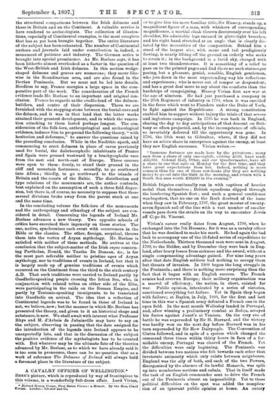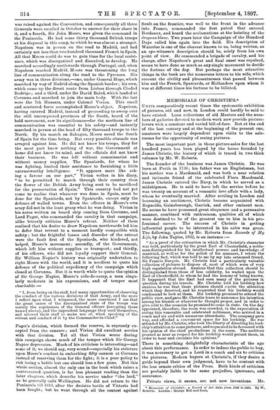A CAVALRY OFFICER OF WELLINGTON.* SHER'S picture, which is reproduced
by way of frontispiece to this volume, is a wonderfully full-dress affair. Lord Vivian,
• Richard Hussey Vivian, First Baron Vivian: a Memoir. By the Hon. Claud Vivian. London Isbater and Co. or to give him hie more familiar title, Sir Hussey, stands up, a, magnificent figure of a man, with whiskers of corresponding magnificence, a martial cloak thrown dexterously over his left shoulder, his admirable legs encased in glove-tight breeches, and his right hand stretched at an angle that is clearly dic-
tated by the necessities of the composition. Behind him a steed of the largest size, with mane and tail prodigiously flowing, is nearly lifting off the ground an orderly who seeks to retain it ; in the background is a lurid sky, charged with at least two thunderstorms. It is something of a relief to pass on to the printed pages and find there no such statuesque posing, but a pleasant, genial, sensible, English gentleman, who jots down in the most unpretending way his reflections and experiences ; who is never out of temper or despondent, and has a great deal more to say about the comforts than the hardships of campaigning. Hussey Vivian first saw war at the age of nineteen. He had just purchased a company in the 28th Regiment of infantry in 1794, when it was enrolled in the force which went to Flanders under the Duke of York, to fight against the Republicans. A strong constitution enabled him to support without injury the trials cf that severe and inglorious campaign. In 1795 he was back in England, sharing the day to day anticipations of that descent on Brit- tany so often projected, and, by the incompetence of officials, so invariably deferred till the opportunity was gone. In 1796, the 28th went to Gibraltar, where, if they did not have an active share in enterprises against the enemy, at least they saw English successes. Vivian writes :—
" Immense fortunes are made here by the privateers; many men from a share of only one-eighth, costing £150, have made £35,000. Colonel Hall, Otter, and our Quartermaster, have all a share in one that sails on Monday for the first time, and they have great expectations from her. Indeed, nothing is more common than for one of these row-boats (for they are nothing more) to go out into the Gutt in the morning, and return with a South Sea man worth 230,000 in the evening."
British frigates continually ran in with captives of heavier metal than themselves ; British squadrons slipped through the lumbering Spanish fleet ; and such a general confidence was begotten, that no one on the Rock doubted of the issue when they saw in February, 1797, the great muster of twenty- seven Spanish sail of the line with a vast number of smaller vessels pass down the straits on its way to encounter Jervis off Cape St. Vincent
Vivian's career really dates from August, 1798, when he exchanged into the 7th Hussars ; for it was as a cavalry officer that he was destined to make his mark. He had again the bad
luck to accompany one of the ill-fated series of expeditions to the Netherlands. Thirteen thousand men were sent in August,
1799, to the Helder, and by December they were back in Eng- land, after heavy losses from sickness and the sword, without a single compensating advantage gained. For nine long years after that date English soldiers had nothing to occupy them
but threats of invasion. In 1808 began the long struggle in the Peninsula ; and there is nothing more surprising than the fact that it began with an English success. The French armies had overrun Europe ; their military organisation was a marvel of efficiency ; the nation, in short, existed for war. Public opinion, intoxicated by a series of victories, sanctioned everything but failure. Yet in Spain they began
with failure ; at Baylen, in July, 1808, for the first and last time in this war a Spanish army defeated a French one in the open field. In the next month Wellesley landed in Portugal, and, after winning a preliminary combat at Rolica, arrayed his forces against Junot's at Vimiera. On the very eve of battle he was superseded by Sir H. Burrard, and the victory was hardly won on the next day before Burrard was in his turn superseded by Sir Hew Dalrymple. The Convention of
Cintra followed, and in spite of a system which changed the command three times within thirty hours in face of a for- midable enemy, Portugal was cleared of the French. Yet the difficulties were only beginning. The Peninsula was divided between two nations who felt towards each other that inveterate animosity which only exists between neighbours.
England was the ally of both, and each of the two Powers, disorganised by the absence of its lawful Monarch, was split up into numberless sections and cabals. That in itself made the task of an English commander sent to drive the French out of the Peninsula almost an impossibility. Yet to them
political difficulties on the spot was added the complica- tion of an ignorant public opinion at home. An outcry
was raised against the Convention, and consequently all three Generals were recalled in October to answer for their share in it, and a fourth, Sir John Moore, was given the command in the Peninsula. He had some thirty thousand British troops at his disposal in this army, to which he was almost a stranger. Napoleon was in person on the road to Madrid, and had certainly not less than two hundred thousand French in Spain. All that Moore could do was to gain time for the local resist- ance, which was disorganised and disunited, to develop. He marched accordingly northwards through Portugal, and, when Napoleon reached Madrid, Moore was threatening the long line of communication along the road to the Pyrenees. His army was in three divisions,—one, under General Hope, which marched by way of Madrid along the Spanish border; his own, which came up the direct route from Lisbon through Ciudad Rodrigo ; and a third, under Sir David Baird, which landed at Corunna and marched to join the main body. With the last were the 7th Hussars, under Colonel Vivian. This small and scattered force accomplished Moore's object. Napoleon, having entered Madrid, instead of proceeding to sweep over the still unconquered provinces of the South, heard of the bold movement, saw its significance—for the northern line of communication was essential to his safety—and instantly marched in person at the head of fifty thousand troops to the North. By his march on Sahagun, Moore saved the South of Spain for the time being. But every possible obstacle was arrayed against him. He did not know his troops, they for the most part knew nothing of war, the Government at home did not know its mind, and the officials did not know their business. He was left without commissariat and without money supplies. The Spaniards, for whom he was fighting, limited their assistance to furnishing a little untrustworthy intelligence. "It appears more like ask- ing a favour on our part," Vivian writes in his diary, "to be permitted to march through their country than the flower of the British Army being sent to be sacrificed for the preservation of Spain." This country had not yet come to realise that whatever was done in Spain, must be done for the Spaniards, not by Spaniards, except only the defence of walled towns. Even the officers in Moore's own army did not in the least grasp what he was doing. Vivian in his notes written on board ship coming from Corunna, and Lord Paget, who commanded the cavalry in that campaign, alike bitterly criticise Moore's retreat. Neither of them realised that his desire to draw Napoleon northwards led him to defer that retreat to a moment hardly compatible with safety ; but the frightful losses and disorder of the retreat were the fault first of the Spaniards, who hindered, not helped, Moore's movement ; secondly, of the Government, which left him without supplies or transport ; and thirdly, of his officers, who did not loyally support their General. Sir William Napier's history was originally undertaken to right Moore with the world, and it is needless to quote his defence of the political expediency of the campaign which closed at Corunna. But it is worth while to quote the opinion of Sir George Napier, Moore's aide-de-camp, a man singu- larly moderate in his expressions, and of temper most charitable :—
"I, from being on the staff, had many opportunities of observing the conduct of the various divisions of that Army, and the more I reflect upon what I witnessed, the more convinced I am that the great cause of the disorganised state of the troops was mainly the supineness of the General officers (excepting those named above), and the imprudent language they used themselves, and allowed their staff to make use of, when speaking of the retreat and conduct of it by the Commander-in-Chief."
Paget's division, which formed the reserve, is expressly ex- cepted from the censure ; and Vivian did excellent service with that division. Yet all that Vivian wrote during this campaign shows much of the temper which Sir George
Napier deprecates. Much of his criticism is interesting—and some of it, we should say, very sound—especially his stricture upon Moore's conduct in embarking fifty cannon at Corunna
instead of reserving them for the fight; it is a poor policy to
risk losing a battle lest one should lose a few guns. But this whole section, almost the only one in the book which raises a controverted question, is far less pleasant reading than the later chapters, which describe his service under "the lord," as he generally calls Wellington. He did not return to the Peninsula till 1813, after the decisive battle of Vittoria had
been fought; but he went through all the contest against
Soult on the frontier, was well to the front in the advance into France, commanded the first patrol that entered Bordeaux, and heard the acclamations at the hoisting of the drapeau blame. Two years later the Campaign of the Hundred Days called him again into the field. His description of Waterloo is one of the clearest known to us, being written, as an eye-witness's description should be, solely from his own point of view. He commanded a brigade of cavalry, and his charge, after Napoleon's great and final onset was repulsed, seems to have done as much as any single movement to decide the fortune of the day. But perhaps the most attractive things in the book are the numerous letters to his wife, which recount the civility and pleasantnesses that passed between him and the French, Spaniards, or Hollanders upon whom it was at different times his fortune to be billeted.



































 Previous page
Previous page